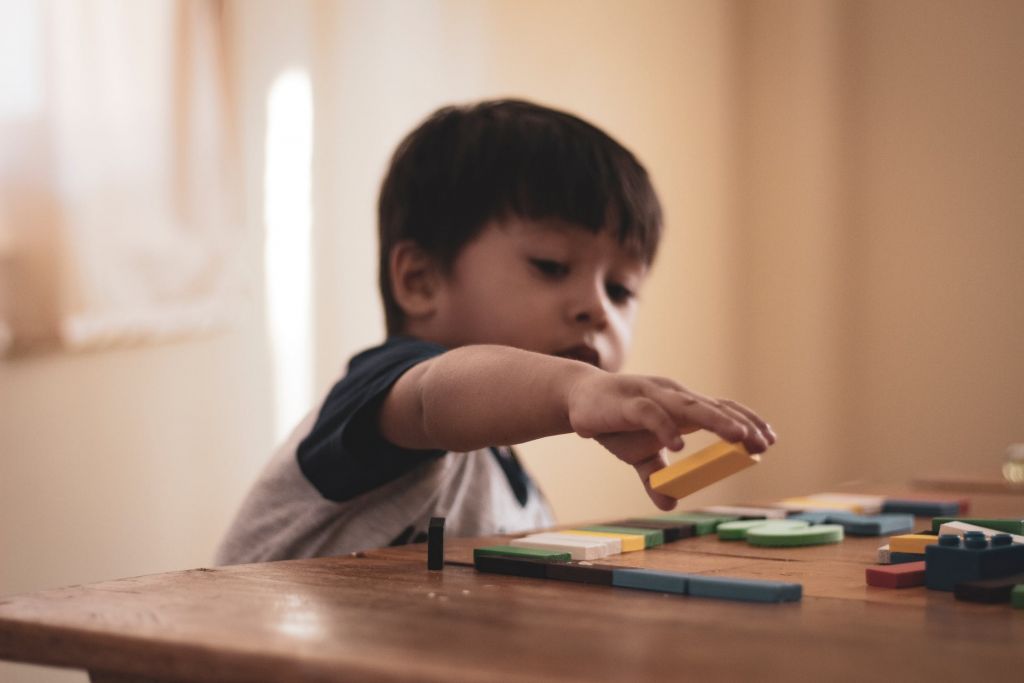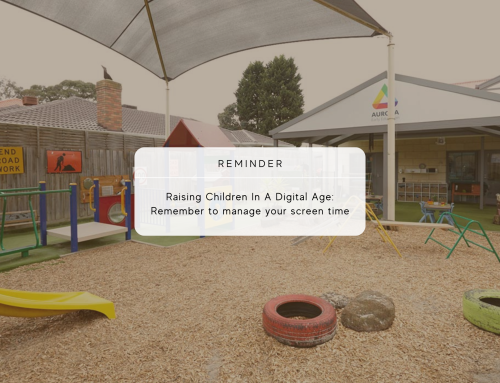By Aurora educators.
In most households (especially ones with young children in them), mornings are always a mad rush to get through the long list of things to do to get everyone ready for the day.
Challenge 1: There’s never enough time.
There is nothing more special or important than to connect with your child before the morning rush begins, before you find yourself starting to yell out commands and counting down the time.
Give your child a quick hug and a friendly “good morning”. This quick moment of connection can go a long way towards encouraging them to cooperate as the rush descends.
Try and have as many things as possible organised the night before; bags packed, clothes on the end of beds, lunches in fridge and so on.
Ensure your little one is getting plenty of sleep at night to hold them in good stead in the mornings. Most 1 and 2 year old children need 11-14 hours of sleep while 3-5 year olds need 10-13 hours of sleep. Mornings are hard enough without having to dress and feed a child that is still dreary with tiredness!

Make sure you are giving your child ample time to complete tasks; they are still learning about the world around them and how to complete tasks efficiently. Do allow time for them to practice these independent skills – as this will prove a great benefit in the future. Don’t be tempted to do everything for them, even if it is faster!
Challenge 2: My child refuses to eat breakfast.
Breakfast is the most important meal of the day and we all want our children to have a full tummy in the morning before they leave the house.

There are usually two main reasons why children don’t want to have breakfast in the mornings. Firstly some children are just simply not hungry at the exact time you are offering breakfast in the morning and secondly (more commonly) children don’t want to have to stop whatever it is they are doing at the time to sit at the table and eat.
Even if your child says they are not hungry, always offer food and make it part of the morning routine that everyone eats breakfast together if possible. Explain that food in the morning will make their tummy happy and help them to have more energy to play during the day.
Perhaps you can make a list of your child’s favourite foods or suggestions for breakfast time and let them choose what they want from their list each day to ease the morning rush.
You should never force a child to eat as it is their choice, however it is our job to strongly and patiently encourage them to eat! Try not to get into bad habits by simply skipping or ignoring the need for breakfast as this gives the wrong impression.
If all else fails you can always offer a nutritious smoothie or healthy light snack to have in the car on the way to childcare or school.
Challenge 3: My child wakes up way too early.
When a child wakes up early, parents find that there’s too much time in the morning to get through the morning task lists. How do you motivate them to get ready when there is actually no immediate need to?

The key here is to have your child get dressed and eat breakfast and brush their teeth straight away or in stages before going off to play – explain to them that this will allow for more play time as they will already be ready to head out the door when it is time. If necessary,alternate between a fun activity and a boring one; go get dressed and then come back and play with your toys, eat your breakfast and then you can have a quick play before you brush your teeth. You could also use a timer that buzzes to remind them to brush their teeth or pack their bag. If you want to avoid screen time in the mornings, have your child put together a ‘morning box’ the night before of exciting games or toys they can use in the morning.
Challenge 4: My child is always so cranky in the morning.
Always assess whether your child is getting adequate sleep and whether the night time routine needs to be addressed.
Also factor in if they have had a rough night or gone to bed particularly late or if there are other factors affecting their ability to get a restful night’s sleep such as a new sibling, growth spurt, absent parent or changes at childcare.
Some children are just cranky in the mornings, just like some adults are. Rather than get frustrated when your child raises their voice at you or barks answers back during the morning rush – simply acknowledge their feelings and show compassion. “I can see that you’re still waking up, would you like me to help you organise your breakfast or pack your bag?”
Don’t shut off communication completely; most children don’t choose to be cranky; it’s just how their waking up process is.
Challenge 5: My child can’t seem to stay focused on getting ready.
Most parents feel like a broken record in the midst of the morning rush, at least some of the time. How many times did you have to ask your child to put his jacket on or turn the TV off? Children are notorious for getting distracted and losing interest in doing certain things they consider to be further down the priority list than you do. Maybe make a list with pictures of activities that need to be completed in the morning and ask your child to place a sticker next to the ones they have already completed. Then ask, where are you in your list? What comes next?
Validate their feelings if they are reticent to get out the door “I can see you’re having fun playing with the dinosaurs but it is time to go now. I know it’s hard to leave home and your toys but you will be back soon enough”.

Sometimes, intellectually we know our children are able to put on their own clothes or brush their teeth but emotionally it can be too much to process to have to move away from the comfort of mum or dad and into an activity they really can’t be bothered doing. In those situations, it is okay to lend a hand – you won’t be putting their pants on when they are a teenager!
Do you have any ways to make the morning rush go smoother?
Read more:
Aurora Early Education: How to Create a Smooth Bedtime Routine.
Have a trip to our centres:





